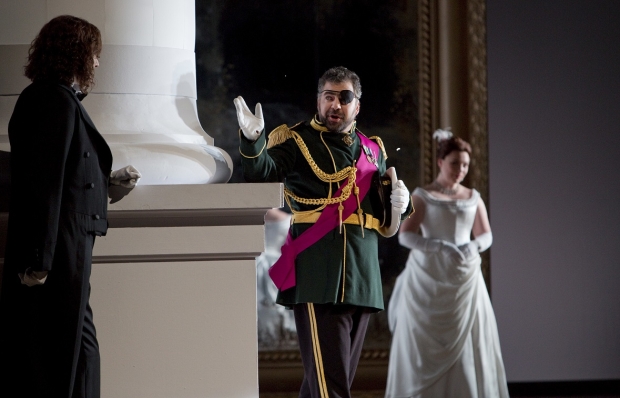Review: Eugene Onegin (Wales Millennium Centre, Cardiff)

© Betina Skovbro
When a director stages Tchaikovsky’s Pushkin opus with the narrative simplicity that James Macdonald achieved in his 2004 account for Welsh National Opera, here revived by Caroline Chaney, it shines as one of the incontestably great operas. Liberated from today’s tired insistence on modish doubling and ghostly revenants, the work’s passions and ironies are conveyed with devastating clarity.
Like Tolstoy’s War and Peace, Eugene Onegin is a study in developmental evolution. The central characters Tatyana and Onegin seem destined to love each other, but their emotional trajectories go in opposite directions so it never quite happens. Early on, the impulsive young heroine falls for an immovable object in buttoned-up Eugene, but once she’s matured and wedded to Prince Gremin the late-blooming self-awareness of her former crush is itself confounded. No one ends up happy.
Spare but intelligent, Macdonald’s staging is full of sublime touches. I’d trade all the gimmicks going for the pleasure of having spotted a sea of books under Tatyana’s chaise longue in the final scene. What a powerful way to show that for all her new-found airs, deep down the serene princess is still the dreamy young romantic. It makes her eventual self-sacrifice all the more heroic.
Tobias Hoheisel‘s uninspired sets are no more than functional, scene-change pauses are overlong and together with a superfluous second interval make for an excessively protracted evening, yet this is still one of the most affecting Eugene Onegins I have seen. Much of the credit for that belongs to Natalia Romaniw, whose Tatyana this time round is, if anything, even finer than her startling assumption of the role last summer at Garsington Opera. The Welsh soprano’s ample voice is brilliantly focused, its timbre huge yet vulnerable, and as an actress her characterisation has extraordinary depth as she traces Tatyana’s development from child to woman. It is one of the performances of the year.
'Female characters are outstandingly well sung'
In fact all the female characters are outstandingly well sung. Claudia Huckle as Olga matches her stage sister all the way, or at least as far as the soon-vanished character allows her to, while Camilla Roberts as their mother and Liuba Sokolova as the kindly old nurse Filipyevna are a delightfully contrasted pair as representatives of the older generation.
Nicholas Lester wears Onegin’s unhappiness grimly. He sings the role with an attractive, even tone and thoroughgoing engagement but is not flattered by costumes that age him and would better suit a sour undertaker than an object of adolescent infatuation. To be frank, when he mansplains to young Tatyana why they are ill-suited to each other he is merely stating the obvious. Yet he crumbles splendidly at the end.
As the doomed Lensky, Jason Bridges sings sweetly with a mellow tenor voice that has little or no Russian character. Much better cast is Miklós Sebestyén as a growling, touching Prince Gremin, thoroughly plausible as Tatyana’s battle-scarred older husband.
It is good to see the opera’s dance sequences choreographed (by Stuart Hopps) for their full value – even though the vocally rousing WNO Chorus was a little stiff on terpsichorean front – and it was especially rewarding to hear Tchaikovsky’s magnificent orchestrations rendered with such attention to detail by Ainārs Rubiķis. His phrasing and dynamics were as affecting as his sense of romantic flow, and the WNO Orchestra responded to the Latvian maestro with idiomatic panache.
There are two further performances of Eugene Onegin at WMC on 6 and 13 October. It then tours to Southampton, Llandudno, Birmingham, Liverpool, Bristol and Oxford until 30 November.










